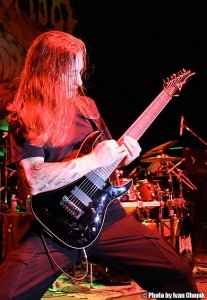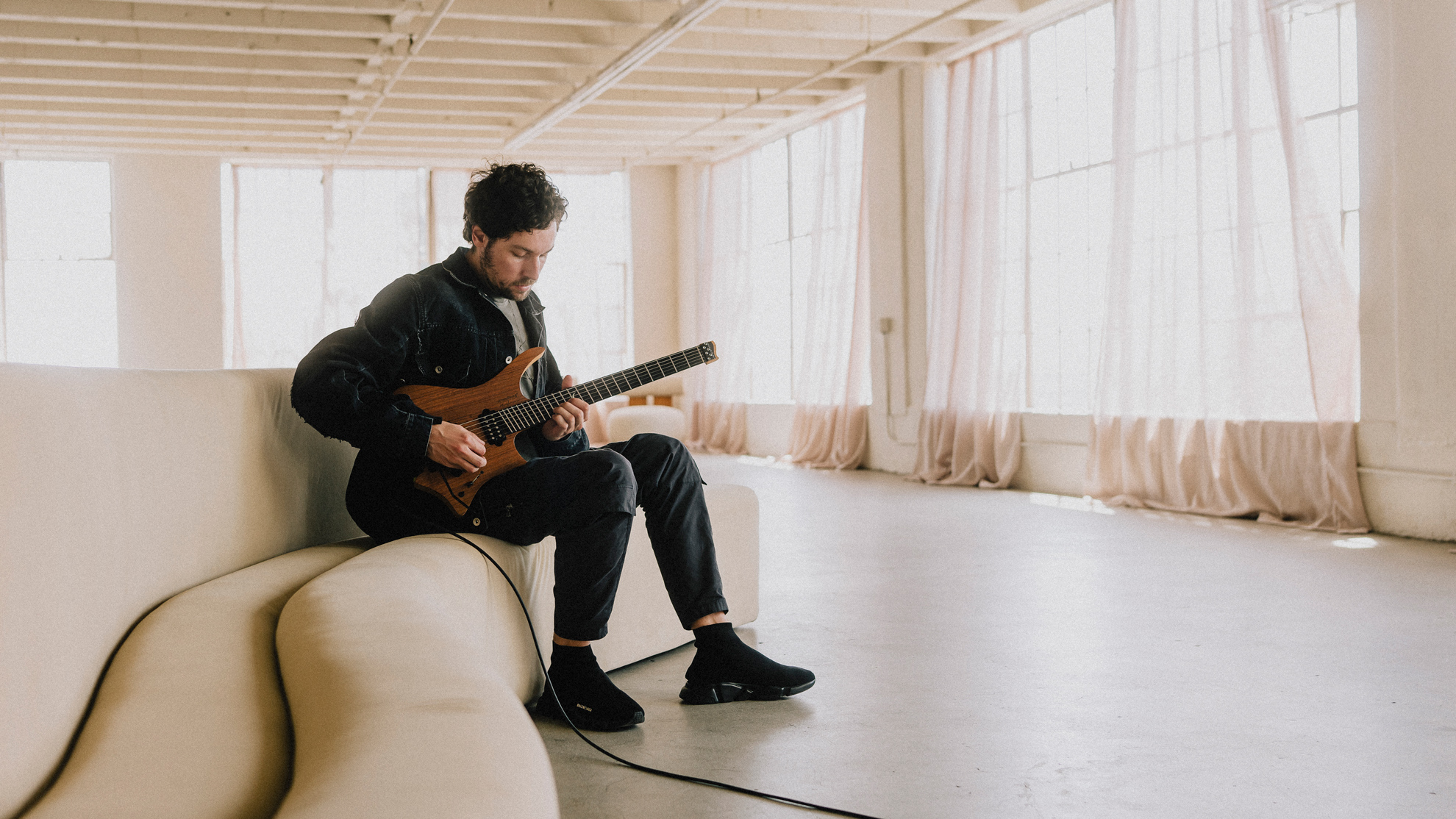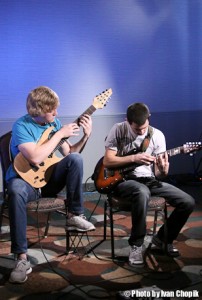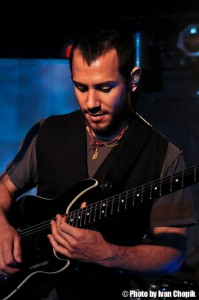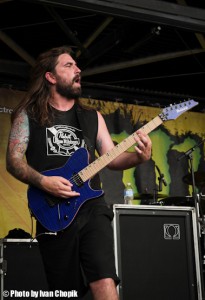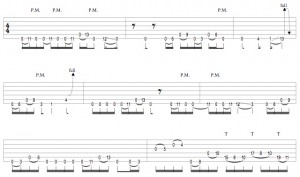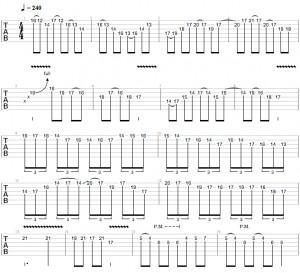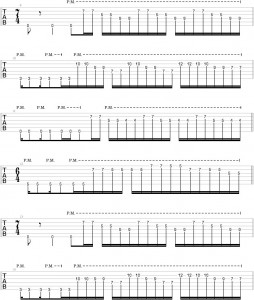 In PART ONE of our interview, guitar maestro Francesco Artusato revealed details about the formation of his new band, Devil You Know, and gave us a glimpse into the writing sessions that spawned the group’s debut record, The Beauty of Destruction.
In PART ONE of our interview, guitar maestro Francesco Artusato revealed details about the formation of his new band, Devil You Know, and gave us a glimpse into the writing sessions that spawned the group’s debut record, The Beauty of Destruction.
In this next segment, Francesco offers some insight about his upcoming solo instrumental record, his approaches to expanding music harmony, and what it means to be a professional musician:
IC: I know you have some new solo material in the works. What can you tell us about that and how it’s coming together?
FA: All I do when I’m home and not on tour, is write music. And it happens that some material goes to one record, and some goes to an instrumental record. I actually finished a whole record – a second solo album. It’s pretty different from the first one and I’m really, really happy with it. It will get released sometime this year.
IC: Will there be any guest appearances?
FA: Yes! One of the tracks on the record has a few of my friends and great guitar players that I know. One is Per Nilsson. I’ve been a fan of his playing forever and I got to meet him a few years ago – he’s awesome. And when I asked him and he said ‘yes,’ I was stoked.
And then Wes Hauch – another friend and incredible player, so it was awesome to have him. And Ryan Knight from The Black Dahlia Murder. Same thing – toured with him before, it’s like we’re best friends, and I admire his playing a lot. On that track there’s also crazy stuff going on with bass solos, and drum fills and solos. It’s a fun track; everybody is really showing what they can do. It’s awesome!
IC: How is this material different from your first solo album?
FA: It’s definitely a lot more organic, even though I didn’t actually get to go to a studio and play the music live, but that’s how I wrote it. I wrote it really thinking about playing songs from start to finish. I feel like it’s more organic, more alive. It feels like a band playing… and the fact that I had awesome players also [helps]. There’s Ray Riendeau on bass and Danny Handler on drums. So this time I really got to enjoy that part and feel like a band.
IC: What are you working on right now as a guitar player?
FA: I wish that I had more time to actually work on the guitar playing part. It’s something that I’ve done for so many years, where I would have just focused on that. Now, I feel like when I sit down it’s mostly about writing music, so I don’t really practice. I practiced a lot before going in the studio for this record, because I wanted to go in and just nail riffs and solos and everything, and feel really comfortable.
Of course, then, a lot of the stuff changed while I was in the studio; a lot of what I was practicing was different…. [but it’s] all good. I mean, I still try, especially for lead stuff, to come out with fresh ideas. But I feel it’s like I haven’t done too much [practicing] lately. I’m still, obviously, in love with the guitar playing part of this whole thing.
IC: I heard that in your years when you were coming up and learning, you played through [John Petrucci’s instructional video/book] Rock Discipline every day straight for a year. Is that true?
FA: Oh, yeah. That was part of my routine every day. It was probably even more than a year. It’s been a few years, but I think I still remember… I could practice the whole thing even without the book. I remember every example and everything. For that specific aspect of guitar playing, it’s probably the best book that I’ve ever seen.
IC: One thing I really like about your playing is the phrasing and the more angular motion that you often have [in your lines]. And then you often stretch things out harmonically, also. For a player who’s comfortable with pentatonic scales, minor scales, and some of the more common patterns in metal playing – what advice can you give them to start expanding their playing and taking it to those different places?
FA: One thing that kind of changed the way I was playing, especially when I started getting more into a classical composition, was seeing how a lot of the composers (like the modern composers), pretty much create their own scales. That made a lot of sense.
| Click play above to watch part 2 of the video for this interview. |
I don’t really have to play this scale that I’m supposed to play. I can just do whatever I want. Sometimes, inside that one line you can actually combine different sounds. Sometimes, I don’t really think about, ‘Is it right or not?’ Even now, if I were to analyze some of the stuff that I play, I would find, ‘This actually doesn’t really make total sense, but it sounds good and I’m going to do it.’
It’s the approach of: first learn as much as you can, and then do whatever you want with it. That’s what I try do with guitar playing. I feel you should never force yourself to play things that don’t sound good to you. Some people think, ‘I need to play weird scales, because they’re fancy and they’re cool to play.’ But if it’s not in your ears, you shouldn’t play them. You’re not going to be able to play them in the correct way. It’s a whole different thing when they actually are in your ears, and that’s what you’re putting on the guitar. That’s what I would suggest – that’s what I do.
IC: If you could look back at yourself as you were coming up, learning all these things, is there anything that you would have told a younger self to try differently, because you could have saved a lot of time?
FA: It’s hard to say. I’m really happy with what I have right now, so even if I made a bunch of mistakes, and I know I did, it still got me to this point. And I’m really happy in life, happy with what I’m doing in my career. Obviously, there are probably a few things I could have done better, in a smarter way, to make things happen faster I guess, but you live and learn.
 In terms of guitar playing, in terms of music, sometimes I wish I still had the time that I used to have. When we were at Berklee [College of Music]… there were all the classes, all the homework, but it still felt like I had all the time in the world to just focus on music. Now there are certain situations with touring and traveling, where sometimes you spend a few days not even touching the guitar. And it’s weird, because I used to be obsessed with just playing guitar. Now it’s like I don’t get to play for a few days, because we’re traveling, there’s crazy scheduling and all that. That’s definitely different.
In terms of guitar playing, in terms of music, sometimes I wish I still had the time that I used to have. When we were at Berklee [College of Music]… there were all the classes, all the homework, but it still felt like I had all the time in the world to just focus on music. Now there are certain situations with touring and traveling, where sometimes you spend a few days not even touching the guitar. And it’s weird, because I used to be obsessed with just playing guitar. Now it’s like I don’t get to play for a few days, because we’re traveling, there’s crazy scheduling and all that. That’s definitely different.
IC: When we wrapped up our previous interview, I asked you for a piece of advice for upcoming musicians. You mentioned that besides the guitar playing, the band dynamic is also very important, as is carrying yourself like a professional; that if you do so, you will ultimately find your place. Is there another piece of advice you can offer to upcoming musicians, maybe something you picked up along the way during the last couple of years?
FA: I still feel like the most important thing is: if you want to be in the professional world of music, treat it like a job. So many people think music is all fun and drinking and whatever, showing up on stage half-wasted. I never see it that way. For me it is a job. If I had [another] job, I would have to show up at a certain time every day, do my things, and that’s it.
It’s even more than a job, because I never get to go home and not do it, because that’s all I do. When I’m on the road, I’m always thinking, constantly. Especially in a band like this when, even though we have managers and agents and lawyers and things like that, I still try to be in control… not in control, but I try to know what’s going on about everything.
The business aspect; in this band it’s been more [prevalent for me] than in previous bands. Since it started, I was there since day one. I’m so present with everything that is happening. That’s even less about just music. Now it’s a lot more about the business aspect. Keep all that in mind – you’re not just going to be playing guitar and relaxing the rest of the time. It’s a full-time job on the road. It doesn’t matter if you’re playing forty minutes or an hour a day; everything else you’re doing during the day is a job.
IC: I know the first [Devil You Know] album just came out. Any talks about putting all that material that you have towards a second album?
FA: John and I already started writing new material. We already have five, six songs that are new, so it’s kinda like it’s never going to stop. I don’t think with this band we’re ever going to feel like, ‘We’ve got to write another record. Let’s start writing music.’ We just write.
We have so much material that we still love from the stuff that we didn’t use for the first record, and that could turn it into something that would be on the second record. Who knows? I’m not worried that we’re not going to have enough material. So that’s really cool to know; [that you’re working] with somebody who’s that into it, also. So yeah, it’s probably going to be a combination of old stuff, new stuff, or just all-new stuff.
[Special thanks to Brandon Epling for his excellent video work!]
Click HERE to view our gear segment with Francesco, where he walks us through his arsenal of Ibanez guitars.






